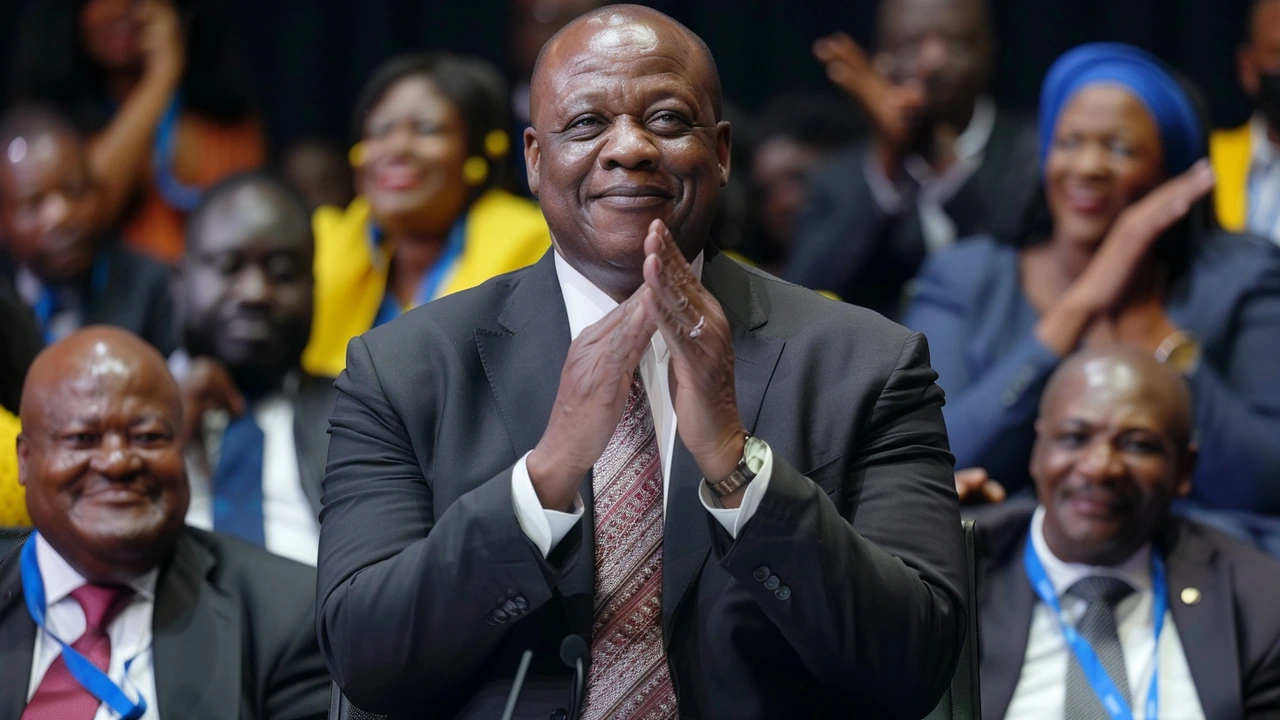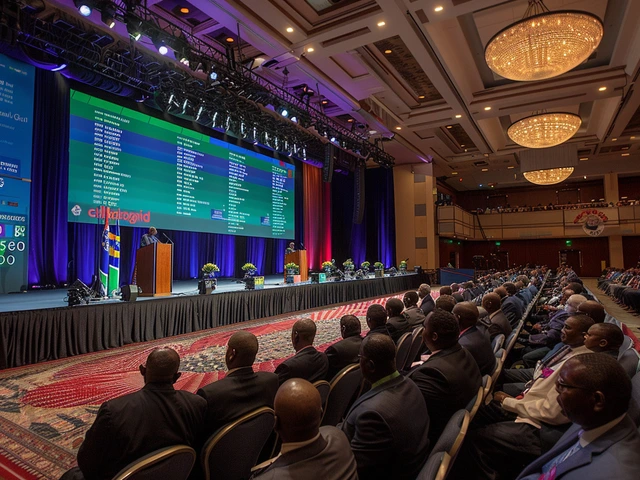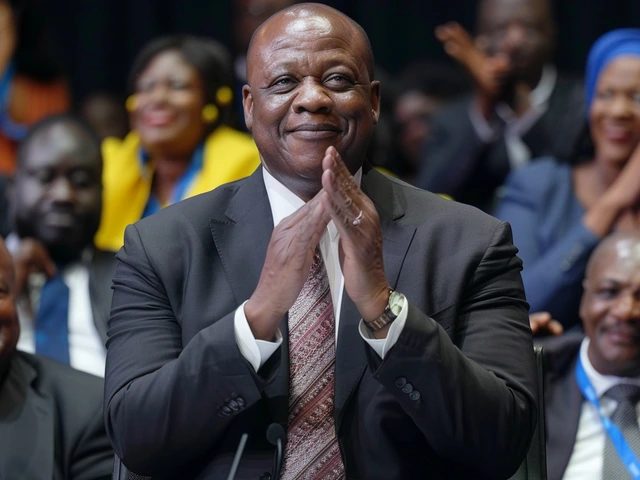South Africa's Political Landscape Shifts as Ramaphosa Secures Second Term
In a momentous turn of events, South African President Cyril Ramaphosa has secured re-election for a second term, a historic victory given the turbulent political environment. On a riveting day in Parliament, Ramaphosa clinched 283 votes against his primary rival, Julius Malema of the Economic Freedom Fighters, who garnered only 44 votes in the 400-member house. This achievement marks a significant chapter in South Africa's political narrative, influenced by the African National Congress's (ANC) diminished hold on Parliament.
At the ripe age of 71, Ramaphosa’s victory is not just a personal milestone but a national turning point, reflecting the shifting dynamics within South Africa's political framework. The ANC, which had reigned supreme since the end of apartheid in 1994, saw its majority whittled down to 159 out of 400 seats in the recent national election. This seismic shift forced the ANC to pivot and negotiate a last-minute agreement with the Democratic Alliance (DA) and at least two other smaller parties, resulting in an unprecedented coalition government of national unity.
Formation of a Coalition Government
For the first time in South Africa’s post-apartheid history, no single party holds a decisive majority in Parliament. This groundbreaking coalition has been hailed by Ramaphosa as a 'new birth, a new era for our country,' emphasizing the need for diverse political entities to bridge their differences and unite for the common good. This sentiment was echoed by John Steenhuisen, leader of the DA, who affirmed the party’s commitment to co-govern the nation 'in a spirit of unity and collaboration.'
The formation of this coalition underscores a dramatic shift towards greater inclusivity and collaboration in South African politics. The DA, traditionally known for its centrist, business-friendly policies, and the ANC, which has roots in liberation politics, must now navigate their differing ideologies to find common ground. This alliance includes reconciling contrasting views on international matters, such as the ANC’s accusations against Israel regarding genocide in Gaza—a stance the DA does not support.
Historical Context and Future Implications
The ANC's reduced dominance symbolizes a notable shift in the electorate's sentiments. Since the dawn of democracy in South Africa, the ANC was regarded as the uncontested political force, owing much of its stature to its central role during the anti-apartheid struggle. The party’s unquestioned authority faced growing scrutiny in recent years due to accusations of corruption, governance failures, and declining public trust. These factors likely played a role in the ANC's reduced majority, compelling it to seek new alliances and reshaping the political landscape.
This coalition could herald a fresh approach to governance, one grounded in broad consensus and diverse representation. However, the task ahead is uncharted territory and fraught with potential obstacles. Balancing the divergent policy positions within the coalition will be challenging. Analysts predict that while the unity government holds promise, its success will hinge on the involved parties' ability to reconcile differences and prioritize national interests over partisan agendas.
Challenges and Opportunities for the Coalition Government
The road ahead for the coalition government is complex. Central to their challenge is aligning the varying policy perspectives into a cohesive governing strategy. The ANC’s traditional focus on socioeconomic reforms and addressing historic inequalities contrasts sharply with the DA’s emphasis on market-driven growth and business-friendly policies. Striking a balance between these disparate philosophies will be crucial to ensuring effective governance.
A key area of concern is economic policy. South Africa faces significant economic challenges, including high unemployment rates, sluggish growth, and economic inequality. The ANC's approach typically involves direct state intervention, while the DA advocates for a more liberal economic framework. Reconciling these approaches to present a united front in addressing South Africa's economic woes will be a litmus test for the coalition’s efficacy.
Reactions and Prospective Path Forward
The reaction to the coalition has been mixed. Supporters hail the agreement as a necessary step towards a more inclusive and representative government. They argue that it brings together a broader spectrum of ideas and solutions, which is essential for tackling the complex issues facing South Africa. Critics, however, caution that the ideological divides within the coalition could lead to instability and ineffective governance.
Despite these challenges, there is a sense of cautious optimism surrounding this new political arrangement. If successful, the coalition could become a model for future governance, demonstrating the power of collaboration and unity in addressing national issues. This experiment in shared governance will be closely watched, not just within South Africa, but globally, as an example of how countries with deep political divides can come together for the common good.
As President Ramaphosa commences his second term, the eyes of the nation, and indeed the world, will be on South Africa. The coalition government embodies both hope and uncertainty, and its ability to navigate these unchartered waters will be pivotal. Ultimately, it is a testament to South Africa’s evolving democracy—a democracy where coalition-building and collaboration become the bedrock of political progress.




Comments
The electoral outcome underscores a paradigmatic shift in South Africa's power matrix, where coalition governance necessitates inter‑party policy harmonization, a process best understood through the lens of multi‑modal governance theory. This realignment compels stakeholders to adopt synergistic frameworks and leverage cross‑cutting institutional mechanisms.
It’s heartening to see a new era of collaboration taking shape; the coalition could spark fresh optimism across the nation. While challenges remain, the shared commitment to unity bodes well for progressive reform.
Observing the political tableau of South Africa at this juncture feels akin to watching a slow‑burning sunrise over the horizon of collective destiny; the light, though diffused, gradually illuminates the contours of a society striving for equilibrium.
Each party now stands as a distinct thread woven into the broader tapestry of governance, and the strength of the fabric will be measured by the tension and harmony among those threads.
Historically, the ANC’s singular dominance fostered a monolithic narrative, yet the emergence of a coalition invites pluralistic discourse, where divergent philosophies can coexist in a concerted symphony.
The ANC’s legacy of liberation still casts a long shadow, but the DA’s market‑oriented pragmatism introduces a counterbalance that could rectify fiscal imbalances.
Beyond economics, social policies will undergo a dialectic process, as the coalition must reconcile the ANC’s transformative agenda with the DA’s emphasis on individual liberties.
This negotiation resembles a delicate dance, each step demanding both concession and conviction.
Internationally, observers will gauge South Africa’s ability to meld these perspectives as a litmus test for post‑apartheid resilience.
Moreover, the inclusion of smaller parties injects fresh voices that may champion issues previously marginalised.
The inevitable friction points-such as divergent stances on foreign policy-will test the coalition’s capacity for compromise.
Yet, the very act of coalition‑building signifies a maturation of democratic institutions, moving beyond hegemonic rule toward shared stewardship.
In this context, the electorate’s message is unmistakable: demand for accountability and inclusivity has reached a crescendo.
Policy formulation will now likely adopt a more iterative, evidence‑based approach, as stakeholders seek commonsense solutions over ideological dogma.
The road ahead is uncharted, but the collective will to navigate it may become the defining narrative of this generation.
Ultimately, the success of this experiment will hinge on the willingness of all parties to prioritize national interest over partisan gain.
Should they rise to the occasion, South Africa could set a precedent for coalition governance in emerging democracies.
Conversely, failure to harmonize could plunge the nation into legislative gridlock, eroding public trust.
Either outcome will reverberate through the annals of African political development for decades to come.
The coalition looks like a shaky house of cards, propped up by desperate compromises rather than genuine consensus. One can only watch skeptically as policy paralysis looms on the horizon.
Culture meets politics here, folks the blend is wild the stakes are high
Yeh, this is super excitng! I kno it will bring good vibes and help ther people get on track. Let’s keep the energy up, fam.
Wow, the new coalition feels like a fresh start! 😊 It's great to see different voices coming together for the country.
While the formation of a coalition signifies a democratic stride, it remains imperative that all parties honor their commitments to governance and public welfare.
Exciting times ahead! 🎉 Let’s hope this partnership fuels real progress for everyone.
Oh, fantastic-another grand experiment in collective indecision. Because what the country needs most is a committee to decide on everything while everyone pretends it’s a breakthrough.
Sounds like a mess.
To claim that this coalition will magically resolve South Africa's deep‑seated socioeconomic woes is an exercise in naive optimism; the reality is that entrenched patronage networks and divergent fiscal philosophies will collide, producing policy inertia that threatens to stall any substantive reform.
The ANC's legacy of state‑led redistribution clashes with the DA's market‑centric growth model, creating an irreconcilable dichotomy that will likely result in half‑baked compromises.
Furthermore, the coalition’s internal power‑sharing arrangements risk devolving into bureaucratic deadlock, where each party vetoes the other's initiatives in pursuit of partisan advantage.
Such dynamics inevitably erode public confidence, inviting further instability.
One must marvel at the audacity of framing this alliance as progressive when, in truth, it merely reshuffles the same old power brokers under a different banner, preserving elite interests while cloaking them in rhetoric of unity.
Behold, the grand theatrical production of South African politics, where every actor dons a mask of cooperation while the script writes itself in tragedy. The drama shall unfold, and the audience-us-must endure the endless soliloquies of broken promises.
I appreciate the optimism expressed by many, yet it’s essential we foster dialogue that respects all perspectives, ensuring the coalition’s decisions reflect a balanced approach to both economic growth and social equity.
Coalition formed; outcomes pending.
While some celebrate this political experiment, I remain skeptical; the juxtaposition of ideologies could either birth innovative policies or devolve into perpetual compromise, leaving both constituencies dissatisfied.
What a glorious display of hope! Yet, let us not forget that optimism must be tempered with rigorous scrutiny; the path ahead demands both vision and accountability.!!!
The whole thing feels like a over‑hyped PR stunt, nothing more.